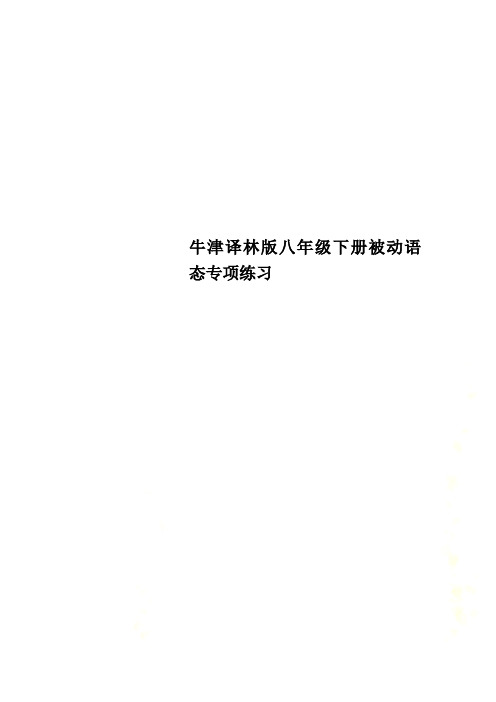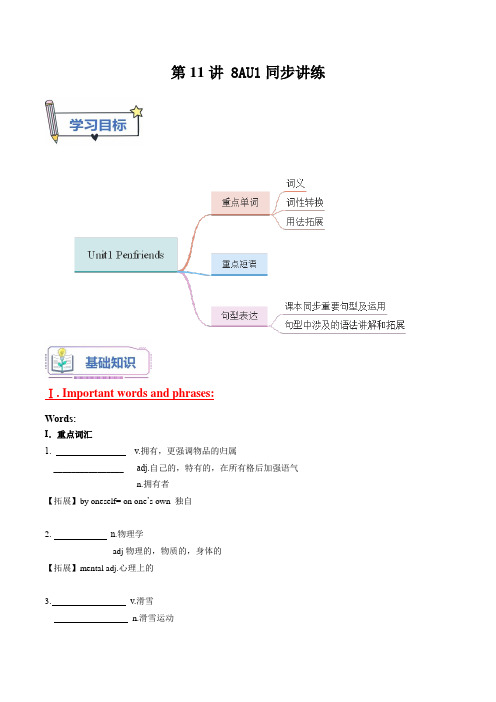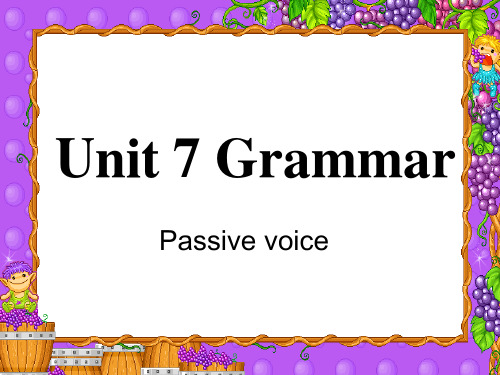八年级英语暑假专题 初中英语被动语态 上海牛津版
初二被动语态专题带答案[1]
![初二被动语态专题带答案[1]](https://img.taocdn.com/s3/m/2b830fb5783e0912a3162a7e.png)
初二英语专题:被动语态I 被动语态的构成: be +过去分词Football is enjoyed by people all over the world.n 从主动语态到被动语态的时态形式变化:主动现在: do/does 过去: did 将 来: shall/will do 现在完成时: have/has done 过去完成时: had done 现在进行时: am/is/are doing 过去进行时: was/were doing 将来进行时: will be doing被动 —am/is/are done — was/were done—shall/will be done— have/has bee n done— had bee n done— am/is/are being done— was/were being done— will be being done【考题分析】I n eed one more stamp before my collection ____A. has completedB. completesC. has bee n completedD. is completed 析:complete 是及物动词, 邮集"是被人完成的,须从表被动意的 C 、D 中选择。
又因before 等引导的时间状语从句中谓语要用一般现在时表将来,所以此题答案为 D 。
【Ex1.】1、 This En glish song ______ b y the girls after class.A. ofte n singsB. ofte n sangC. is ofte n sang2、 New computers _________ a ll over the world.A is used B. are using C. are used D. have used3、 Why ________ to talk about it yesterday?A. did n't a meet ing holdB. was n't a meeti ng heldC. was n't held a meeti ngD. a meet ing was n't held4、 His new book ________ n ext mon th.A. will be publishedB. is publish ingC. is being publishedD. has bee n published5、 一Have you moved into the new house?III . (be+过去分词) 口诀:宾变主,主变宾,谓变 be done ,时不变,数格必须随被变。
牛津译林版八年级下册被动语态专项练习

牛津译林版八年级下册被动语态专项练习八下牛津英语语法讲解与练习------被动语态一、各种时态的被动语态一般现在时:am/is/are+动词过去分词Cars are made by them.一般过去时:was/were+动词过去分词The MP3 was bought by my father.一般将来时:will/shall/be going to be+动词过去分词The bridge will be completed in ten days.现在完成时:have/has been+动词过去分词The meeting has been put off.二、含有情态动词的被动语态含有情态动词的主动句变成被动句时,由“情态动词+be+过去分词”构成,原来带to的情态动词变成被动语态后“to”仍要保留。
歌诀是:情态动词变动,情态加be加“过分”。
例如:we can repair this watch in two days. →This watch can be repaired in two days.We must finish this work soon. →This work must be done soon.We have to clean the classroom. → The classroom has to be cleaned by us.三、主动语态变被动语态需要注意的几个问题.(1)时态保持一致。
I have repaired my computer.---My computer has been repaired.(2)如果要说出动作的执行者,并且这个执行者可以作主动语态中主语时,就用by短语,如果后面的词表示地点,不是动作的执行者,就用in短语。
It is made by us. It is made in Wuhan.(3)主动句的主语是代词的主格形式,变成被动句by的宾语时要用其宾格形式。
牛津译林版八年级下册被动语态专项练习

八下牛津英语语法讲解与练习------被动语态一、各种时态的被动语态一般现在时:am/is/are+动词过去分词Cars are made by them.一般过去时:was/were+动词过去分词The MP3 was bought by my father.一般将来时:will/shall/be going to be+动词过去分词The bridge will be completed in ten days.现在完成时:have/has been+动词过去分词The meeting has been put off.二、含有情态动词的被动语态含有情态动词的主动句变成被动句时,由“情态动词+be+过去分词”构成,原来带to的情态动词变成被动语态后“to”仍要保留。
歌诀是:情态动词变动,情态加be加“过分”。
例如:we can repair this watch in two days. →This watch can be repaired in two days.We must fi nish this work soon. →This work must be done soon.We have to clean the classroom. → The classroom has to be cleaned by us.三、主动语态变被动语态需要注意的几个问题.(1)时态保持一致。
I have repaired my computer has been repaired.(2)如果要说出动作的执行者,并且这个执行者可以作主动语态中主语时,就用by短语,如果后面的词表示地点,不是动作的执行者,就用in短语。
It is made by us. It is made in Wuhan.(3)主动句的主语是代词的主格形式,变成被动句by的宾语时要用其宾格形式。
He cleaned the car. → The car was cleaned by him.(4)疑问句的被动语态,用be动词的对应形式代替doDoes she drive this car →Is this car driven by her(5)谓语为动词短语的被动语态不能丢掉动词短语的介词或副词。
牛津初中教材8B被动语态的用法和补充

牛津教材8B Unit 3-4 被动语态的用法和补充语态语态是动词的一种形式,用来表明主语和谓语动词之间的关系。
英语动词有两种语态:主动语态和被动语态。
主动语态表示主语是动作的执行者;被动语态表示主语是动作的承受者。
谓语动词为主动语态的句子叫主动句;谓语动词为被动语态的句子叫被动句。
例:主动句:They built the bridge.被动句:The bridge was built by them?何时用被动语态?1.不知道或没有必要说明谁是动作的执行者。
例:Mom, you are wanted on the phone. (不知道是谁打的电话)This book was published in 1981. (没必要说出谁出版的)2.强调动作的承受者,不强调动作的发出者。
例:This book was published in 1981. (这里想强调这本书出版了,而不是强调什么人出版的)被动语态的结构和时态变化一、结构1.be + 动词的过去分词(PP)中文:…被…2.be + 动词的过去分词(PP)+ by sb/sth 中文:…被…注:结构2中的by是介词,后接动作的发出者,译成“被/由”二、不同时态里被动语态(被动语态在不同时态里的变化就是be动词在变化,过去分词是不变的,在改被动语态的一般疑问句、否定句、划线提问时,以下结构的第一个词就是它的助动词)1.一般现在时的被动语态:am/is/are + ppOur classroom is cleaned every day.2.一般过去时的被动语态:was/were + ppA new shop was built last year.3.一般将来时的被动语态:will be/is going to be/are gonging to be + ppMore and more trees will be built next year.4.现在完成时的被动语态:have/has been + ppOur homework has been finished already.5.含情态动词的被动语态:情态动词+be + ppYoung trees must be watered often.了解:6.现在进行时的被动语态:_______________________________________ + pp7.过去进行时的被动语态:_______________________________________ + pp8.过去将来时的被动语态:_______________________________________ + pp9.过去完成时的被动语态:_______________________________________ + pp怎样把主动语态改成变动语态歌诀:宾变主,主变宾,by短语后面跟,谓语动词变被动,be后“过分”来使用第一步:把主动语态的宾语放到句首做主语(如遇到代词宾格要还原成主格);第二步:把主动语态的谓语动词变成正确时态的被动语态结构be+pp;第三步:加by+主动语态里的主语(如遇到代词主格要还原成宾格),其他部分照抄。
Unit7 语法--被动语态 Passive voice 讲义--牛津译林版英语八年级下册

被动语态 Passive voice 第一讲Part 2【被动语态】一、概念语态是动词的一种形式,表示的是主语和谓语之间的关系。
,英语动词有两种语态:主动语态和被动语态。
主动语态表示主语是动作的执行者,被动语态表示主语是动作的承受者。
Eg. ①They built a new bridge over the river. (主动) →A new bridge was built over the river by them. (被动)①Many people speak English. (主动) →English is spoken by many people. (被动)二、被动语态的基本用法被动语态由助动词be+过去分词构成,时态通过动词be表现出来。
We use the active voice when it is important to know who performs the action.(1) it is obvious who performs the action动作的执行者是泛指或不言自明时:Eg. None of the books was taken away.(2)We do not know or don’t need to now who performs the action在不知道或没有必要知道动作的执行者是谁时:Eg. The toy is designed for children.(3) the action is more important than the person who performs the action需要强调动作的承受者Eg. Rice was first grown in China.【拓展】(4)出于礼貌或委婉而避谈动作的执行者。
Eg. This problem was talked about just now.(5) 在被动语态句子中,如果我们需要指出动作的执行者,可以由by引出。
2020年沪教牛津版八年级英语下册 专项综合全练(二)含答案

沪教牛津版八年级英语下册专项综合全练(二)被动语态Ⅰ.单项选择1.-What's the meaning of the activity " Let's Save" ?-Paper shouldn't _______ in everyday life.A.wasteB.wastedC.be wastedD.is wasted2.People usually talk about whether books _______by the Internet in the future.A.replaceB.replacedC.will be replacedD.were replaced3.-Your bedroom is so clean.-Of course. It______ every day.A.cleansB.cleanedC.is cleanedD.was cleaned4.It is reported that about 120 foreign experts______to attend the meeting.A.inviteB.invitedC.to be invitedD.will be invited5.-Mom, can I drive my father's car to the cinema?-No way! You should not______ to drive, you don't have a driver's license.A.allowB.allowedC.be allowedD.are allowed6.At last, the boy was made______ computer games and began to do his homework.A.stop playingB.to stop to playC.stop to playD.to stop playing7.Elephants______ carry wood by people long times ago.A.was trainedB.trained toC.train toD.were trained to8.It is said that the project connecting mainland and Hong Kong______ soon.A.is completedB.has completedC.will completeD.will be completedⅡ.用括号内所给词的适当形式填空1.Teenagers should_______ (encourage) to solve their problems by themselves.2.Children are warned____(not play) on the roads.3.The book, Cha Jing, describes how tea plants were____(grow) and used to make tea.4.English_____(speak) all over the world.5.It________(believe)that tea was brought to Korea and Japan during the 6th and 7th.6.Libraries or reading corners____(build) in hope primary schools along the way of Long March in a few years.Ⅲ.将下列句子改为被动语态1.The local government organizes the film festival every autumn.The film festival____ ____by the local government every autumn.2.The waiter took away the plates after we finished eating.The plates___ ____away by the waiter after we finished eating.3.Thousands of tourists visit this park every day.This park____ ____by thousands of tourists every day.4.I often see him play football after school.He is often____ ____play football after school by me.Ⅳ.根据汉语意思完成句子1.你应该亲自签收包裹。
初中英语 牛津上海版8A被动语态讲解及练习(有答案)

被动语态动词的被动语态英语的语态分为主动语态和被动语态,主动语态表示主语是动作的执行者。
被动语态表示主语是动作的承受者。
只有及物动词才有被动语态。
它的基本结构为:be动词+及物动词的过去分词。
所有的时态变化在be动词上。
以动词sing为例。
注意以下几种被动语态的特殊情况:一.被动语态中不定式要还原Let/make/see/hear/watch sb. do sth.----- sb. be let/made/seen/heard/watched to do sth.My mother made me look after the little sister yesterday.----I was made to look after the little sister by my mother yesterday.二.有些动词没有被动语态。
(及物动词才有被动语态)1) 不及物动词或动词短语无被动语态:appear, die,disappear, end (vi. 结束), fail, happen, last, lie, remain, sit, spread, stand break out, come true, fall asleep, keep silence, lose heart, take place.2) 系动词无被动语态:appear, be,become, fall, feel, get, grow, keep, look, remain, seem, smell, sound, stay, taste, turn3) 不能用于被动语态的及物动词或动词短语:fit, have, hold, marry, own, wish, cost, notice, watch,agree with, arrive at / in, shake hands with, succeed in, suffer from, happen to, take part in, walk into, belong to4) 系动词无被动语态:appear, be,become, fall, feel, get, grow, keep, look, remain, seem, smell, sound, stay, taste, turn5) 当宾语是不定式时,很少用于被动语态。
牛津8B unit3--4 被动语态讲解

教师姓名柏娥上课日期2013.6.17.
学生姓名年级8 学科英语课题被动语态及练习
学习目标掌握被动语态的构成及使用要点被动语态的各种时态的运用
被动语态的特殊用法
主动与被动的转换
教学重点被动语态的构成及特殊用法
教学过程
师生活动设计
意向
被动语态
一语态
英语中有两种语态:主动语态和被动语态
主动语态表示主语是动作的执行者。
Eg:Many people speak Chinese. 谓语动词speak的动作是由主语
many people来执行的。
被动语态表示主语是动作的承受者,即行为动作的对象,其构成为:
“be+过去分词”。
Eg:Chinese is spoken by many people. 主语Chinese是动词speak
的承受者。
二被动语态的构成
(一)被动语态的各种时态构成形式(注意变形:否定句、一般及
特殊疑问句)
一般现在时的被动语态am/is/are+done
一般过去时的被动语态was/were+done
一般将来时的被动语态will/shall+done
现在进行时的被动语态am/is/are being+done
过去进行时的被动语态was/were being+done
现在完成时的被动语态have/has been+done。
牛津译林版八年级下册被动语态专项练习

八下牛津英语语法讲解与练习------被动语态一、各种时态的被动语态一般现在时:am/is/are+动词过去分词Cars are made by them.一般过去时:was/were+动词过去分词The MP3 was bought by my father.一般将来时:will/shall/be going to be+动词过去分词The bridge will be completed in ten days.现在完成时:have/has been+动词过去分词The meeting has been put off.二、含有情态动词的被动语态含有情态动词的主动句变成被动句时,由“情态动词+be+过去分词”构成,原来带to的情态动词变成被动语态后“to”仍要保留。
歌诀是:情态动词变动,情态加be加“过分”。
例如:we can repair this watch in two days. →This watch can be repaired in two days.We must fi nish this work soon. →This work must be done soon.We have to clean the classroom. → The classroom has to be cleaned by us.三、主动语态变被动语态需要注意的几个问题.(1)时态保持一致。
I have repaired my computer.---My computer has been repaired.(2)如果要说出动作的执行者,并且这个执行者可以作主动语态中主语时,就用by短语,如果后面的词表示地点,不是动作的执行者,就用in短语。
It is made by us. It is made in Wuhan.(3)主动句的主语是代词的主格形式,变成被动句by的宾语时要用其宾格形式。
He cleaned the car. → The car was cleaned by him.(4)疑问句的被动语态,用be动词的对应形式代替doDoes she drive this car? →Is this car driven by her?(5)谓语为动词短语的被动语态不能丢掉动词短语的介词或副词。
八年级英语暑假专题 初中英语被动语态同步练习 上海牛津版

八年级英语暑假专题初中英语被动语态同步练习某某牛津版(答题时间:30分钟)一、单项选择1. This is the bag _____ my mother bought yesterday.A. thatB. whoC. whomD. this2. The man _____ lives next to us is my English teacher.A. whomB. whichC. whoD. /3. The girl _____ you saw in the street is Mary.A. thatB. whoseC. whichD. as4. Is this the factory _____ a lot of students visited yesterday?A. the oneB. whichC. whoD. whom5. Is this factory _____ a lot of students visited yesterday?A. the oneB. thatC. whichD. /6. The only language _____ is easy to learn is the mother tongue.A. whichB. thatC. /D. it7. The girl handed everything _____ she had picked up in the street to the police.A. whichB. in whichC. thatD. all8. _____ cleans the blackboard should be praised.A. ThatB. WhoC. The one whoD. The students who9. Please show me the book _____ you bought yesterday.A. whichB. whomC. whoseD. this10. This is the best book _____ I have been looking for all this year.A. whoB. whomC. whichD. /11. This is the only article of these that _____ written by him.A. wasB. wereC. isD. are12. The man _____ was here just now is a doctor.A. whomB. whoC. /D. he13. The boy _____ has two lovely dogs.A. who live next doorB. which lives next doorC. whom lives next doorD. that lives next door14. Those _____ made no mistakes in today’s exercises please raise your hands.A. whichB. whomC. thatD. who15. Don’t go in, this is the shop _____ we have just been _____.A. /, toB. that, /C. where, toD. which, there16. He is the most careful boy _____ I know.A. whatB. whichC. asD. /17. This is the school _____ Mr. Smith once taught.A. in thatB. whenC. whereD. there18. Have you visited the house _____ the famous scientist was born?A. whereB. in thatC. thatD. which19. The factory _____ Mr. Li used to work was closed last week.A. whenB. whereC. thatD. which20. Do you still remember the day _____ we first met?A. thatB. whenC. whatD. on that21. The time _____ we studied together is not easily forgotten.A. whenB. thatC. whereD. in which22. October 1,1949 is the day _____ we’ll never forget.A. whenB. thatC. whereD. in which23. October 1,1949 was the day _____ the People’s Republic of China was founded.A. whichB. whenC. whereD. in which24. Is this the shop _____ sells children’s clothing?A. whichB. whereC. in whichD. what25. Is this museum _____ they visited last month?A. thatB. whichC. whereD. the one26. I still remember the sitting-room _____ my mother and I used to sit in the evening.A. whatB. whichC. thatD. where二、在下列定语从句中,填入适当的介词。
初中英语被动语态完整版(牛津英语Unit3语法)

2.不规则动词的过去分词(背):
The pig sweeps the floor every day. The floor is swept by the pig every day.
jacket
The jacket is used for keeping warm.
The jacket is made in China.
1.The city will build the new airport next year. will ____ be _______ built next year. The new airport _____ 2.Huidong Middle School is going to send two students to Hongkong to study. going ______ to ______ be Two students_______ are _______ sent ______to Hongkong to study.
现在完成时的被动语态: have / has + been + PP
时态: 现在完成时 结构:Have/has + been +done
1.Li Ming has already watered some lowers. havebeen watered Some flowers ____ ____ ________by Li Ming already. 2.They have sold out the light green dress The light green dress ________ has been _________ ___________ sold out.
2023年上海新八年级英语暑期教材同步自学(牛津版)第11讲 8AU1同步讲练含详解

第11讲8AU1同步讲练Ⅰ. Important words and phrases:Words:I.重点词汇1. v.拥有,更强调物品的归属________________ adj.自己的,特有的,在所有格后加强语气________________ n.拥有者【拓展】by oneself= on one’s own 独自2.n.物理学____________ adj物理的,物质的,身体的【拓展】mental adj.心理上的3.v.滑雪n.滑雪运动5.adj.高的n.高度【拓展】weigh v.称重weight n.重量wide adj.宽的width n.宽度long adj.长的length n.长度deep adj.深的depth n.深度6.n.德国adj.德国人(籍),德语,德国的【拓展】Canada n.加拿大Canadian n.加拿大人国人的复数变化规则:中日不变英法变,其余都是加s。
以下为复数特殊情况:Chinese, Japanese, British men, French men.10.n.顶部Ⅰ.Write the words according to the explanations(根据英文解释写出相应单词)(错误率:掌握情1.would like to be your penfriend 想成为你的笔友2.their favorite sports 他们最喜爱的运动3.the date under the address 地址下面的日期4.a signature at the end 在末尾的签名5.write to the girl 给这个女孩写信6.want to be your penfriend 想成为你的笔友7.one and a half meters tall 一米五高8.My hobby is playing chess. 我的爱好是下棋。
9.own a Chinese restaurant 拥有一家中餐厅10.work in a college 在一所大学上班11.want to be an accountant 想成为一名会计12.be at university in London 在伦敦上大学e back home during the holidays 在假期期间回家14.be keen on sports 对运动着迷15.enjoy playing baseball and table tennis 喜欢打棒球和羽毛球16.My ambition is to be an architect. 我的志向是成为一名建筑师。
八年级英语 被动语态 上海牛津版

初二英语被动语态上海牛津版【本讲教育信息】一 教学内容:初中英语被动语态二 具体过程:(一)语态概述英语的语态是通过动词形式的变化表现出来的。
英语中有两种语态:主动语态和被动语态。
主动语态表示主语是动作的执行者。
例如:Manpeople. all by at laughed was He him.at laughed people the All f actory. in the by them made are bikes The f actory. in the bikes the make They him.by down cut was A tree tree.a down cut He days.in two repaired be can watch This days. in two watch s repair thi can We once.at done be should It once.at it do should They onth Eectricit i ued to run machine2 被动语态的构成(1)be done 可以是被动语态,也可以是系表结构形式。
被动语态中,done 可以带b 短语,而系表结构中done 相当于ad 不带 b 短语。
如:()()被动语态系表结构us.by settled are questions Suchsettled. is question The ()()被动语态系表结构 . care great ith written w is n compositio The written. well is n compositio The ()()被动语态系表结构 worker.skilled a by done well was job The done. well was job The(2)许多verb (broen, intereted, hut, worried ), 既可以用作ad 也可以在被动语态结构中作过去分词。
牛津 沪教版8年级下册 Unit3 GRAMMAR 初中被动语态详解

She has received many letters since last week. Many letters have been received by her since last week.
(变被动语态)
People use knives for cutting things. Knives ______ ______ for cutting things. The students clean the windows of their classroom twice a month. The windows of their classroom______ _______ twice a month.
①give sth to sb=give sb sth
②buy sth for sb=buy sb sth
③sell sth to sb=sell sb sth
④take sth to sb=take sb sth
⑤bring sth to sb=bring sb sth ⑥make sth for sb=make sb sth
Shoes are made by them.
把主动语态改为被动语态时,句子的时 态不能变。主动句子是一般现在时,改 为被动语态时,也要用一般现在时。
主动句中的主语是人称代词,改为被动 句时作介词by的宾语,要用宾格。 如主语we改为us。
把下列主动句改为被动句 ①Lily writes many letters every day. (主动) → Many letters are written by Lily every day.
sb be let to do sth sb be seen to do sth sb be watched to do sth
牛津英语版8年级下册-Unit7一般现在时的被动语态语法讲解

动作的 people speak English.
English is spoken by Many people.
They plant trees
elavsetryyeyaerar
2.What is needed by ORBIS to help blind people?
3.Where do ORBIS doctors do operations? 4.How many of these cases can be prevented or cured?
1.What is the charity called in English? It is called ORBIS.
A. speaks B. is spoken C. was spoken
一般现在时的被动语态: am / is / are + done
[2]. The lost boy ____ at the street corner last night.
A. was found B. is found C. was looked for
4.A talk on Chinese history _C_ in the school hall
next week.
A. is given
B. has been given
C. will be given
D. will give
What they do every year?
1. Charity activities are planned to help the poor (plan/ to
第04讲复习八下被动语态-2023年新九年级英语暑假精品课(牛津译林版)

第04讲复习八下:被动语态掌握并正确使用被动语态。
1.概念:英语动词有两种语态,主动语态和被动语态。
主动语态的主语是动作的执行者;被动语态的主语是动作的承受者,理解为“被……” 。
2. 结构:被动语态的结构是“be+过去分词”,be动词有时态、人称和数的变化。
当不知道动作的执行者或没必要指出动作的执行者,只强调突出动作的承受者时,用被动语态。
3. 被动语态的重难点:难点(1):动词短语变成被动语态时,要保持完整,不能丢掉其中的介词或副词。
如:The old are taken good care of in the old people’s home.老人们在敬老院被照顾得很好。
难点(2):省略to的动词不定式,在被动语态中要还原to。
难点(3):不用被动语态的词,常见的有:1. 五感官三变化两发生:look,smell,taste,feel,sound,become,get,turn,happen,take place。
如:The flowers smell nice.花闻起来很香。
(不能用are smelt)Great changes took place in China.中国发生了巨大变化。
(不能用were taken place)2. come out,belong to,break out,spread,appear,disappear也不用被动语态。
如:The CD came out yesterday.这个CD昨天就发行了。
(不能用was come out)3. 某些可以和“well,easily,smoothly” 连用的不及物动词,且主语是物体,不用被动语态。
这类词有:read,write,draw,wash,clean,cook,sell,lock,open,cut。
如:This kind of pen writes very smoothly.这种笔写起来很流畅。
(不能用is written)This kind of shirt sells very well.这款裙子卖得很好。
牛津上海版初二下英语常用语法知识——被动语态提高练习(含解析)

一、选择题1.—Which country has the biggest population in the world?— China . It's a little ________than that of India.A.most B.bigger C.more D.biggest B解析:B【解析】【分析】【详解】句意:——世界上哪个国家有最大的人口?——中国。
它的人口比印度大一点。
考查比较级, most最多,最高级;bigger 更大的,比较级;more 更多,比较级;biggest 最大的,最高级。
根据单词“than”,可知这里应该用比较级,再结合句意,可知这里比较的人口数,应该是中国的人口数大于印度。
故选B。
【点睛】在做题时,我们可以利用一些标志词帮助我们快速得到答案,例如本题中的“a little”和“than”都明确的提示了我们应该用形容词比较级。
除此之外,比较级前可用a lot, a little, far, a bit, much, even, a good deal等来修饰,表示程度,意为“……得多”,“更……”,“……甚至”等等。
这些都是能够帮助我们快速判断答案的词。
2.一Where is Mr. Brown?一I think he's _____________ the music hall.A.on B.in C.over D.from B解析:B【解析】【详解】句意:——布朗先生在哪里?——我想他在音乐厅。
考查介词辨析。
on在……上;in在……里;over越过;from来自;根据句意理解可知,这里表达的是“在音乐厅里”,英语是in the music hall,故选B。
3.—Jerry looks so tired. He works too hard.—He has to ________ a family of four on his own.A.offer B.support C.provide D.remain B解析:B【解析】【分析】【详解】句意:——杰瑞看起来很累。
- 1、下载文档前请自行甄别文档内容的完整性,平台不提供额外的编辑、内容补充、找答案等附加服务。
- 2、"仅部分预览"的文档,不可在线预览部分如存在完整性等问题,可反馈申请退款(可完整预览的文档不适用该条件!)。
- 3、如文档侵犯您的权益,请联系客服反馈,我们会尽快为您处理(人工客服工作时间:9:00-18:30)。
八年级英语暑假专题初中英语被动语态上海牛津版【本讲教育信息】一. 教学内容:初中英语被动语态二. 具体过程:(一)语态概述英语的语态是通过动词形式的变化表现出来的。
英语中有两种语态:主动语态和被动语态。
主动语态表示主语是动作的执行者。
例如:Many people speak Chinese.谓语:speak的动作是由主语many people来执行的。
被动语态表示主语是动作的承受者,即行为动作的对象。
例如:Chinese is spoken by many people.主语English是动词speak的承受者。
(二)被动语态的构成被动语态由“助动词be+及物动词的过去分词”构成。
人称、数和时态的变化是通过be的变化表现出来的。
现以speak为例说明被动语态在各种时态中的构成。
一般现在时:am/is/are+spoken一般过去时:was/were+spoken一般将来时:will/shall be+spoken现在进行时:am/is/are being+spoken过去进行时:have/has been+spoken现在完成时:have/has been+spoken过去完成时:had been + spoken(三)被动语态的用法(1)不知道或没有必要说明动作的执行者是谁。
例如:Some new computers were stolen last night. 一些新电脑在昨晚被盗了。
(不知道电脑是谁偷的)This bridge was founded in 1981.这座桥竣工于1981年。
(2)强调动作的承受者,而不强调动作的执行者。
例如:The glass was broken by Mike.玻璃杯是迈克打破的。
This book was written by him.这本书是他写的。
Your homework must be finished on time.你们的家庭作业必须准时完成。
(四)主动语态变被动语态的方法(1)把主动语态的宾语变为被动语态的主语。
(2)把谓语变成被动结构(be+过去分词)(根据被动语态句子里的主语的人称和数,以及原来主动语态句子中动词的时态来决定be的形式)。
(3)把主动语态中的主语放在介词by之后作宾语,将主格改为宾格。
例如:(五)含有情态动词的被动语态含有情态动词的主动句变成被动句时,由“情态动词+be+过去分词”构成,原来带to 的情态动词变成被动语态后“to”仍要保留。
1. 何时使用被动语态(1)不知道谁是动作的执行者或没有必要知道如:Paper is made from wood.The house is quite old. It was built in 1950.He was wounded in the fight.(2)需要强调动作的承受者时如:Calcul ator can’t be used in the maths exam.Books and newspapers in the reading room mustn’t be taken away.He was awarded first prize in that contest.(3)为了使语气婉转,避免提及自己或对方而使用被动语态,或由于修饰的需要,使用被动语态,使句子得以更好的安排。
如:The construction of the new lab must be completed by the end of next month.Electricity is used to run machines.2. 被动语态的构成(1)be+ done 可以是被动语态,也可以是系表结构形式。
被动语态中,done可以带by短语,而系表结构中done相当于adj. 不带by短语。
如:(2)许多verbs(broken, interested, shut, worried), 既可以用作adj.也可以在被动语态结构中作过去分词。
句中如果有by,通常是被动语态。
如:I was worried about you all night. (表状态)I was worried by mosquitoes all night. (表动作)The glass was broken by Jack. (表动作)The glass is broken. (表状态)I was frightened by his ghost story. She was frightened at the sight of a snake.<1>判断关系代词与关系副词方法一:用关系代词还是关系副词完全取决于从句中的谓语动词。
及物动词后面无宾语,就必须要求用关系代词;而不及物动词则要求用关系副词。
例如:This is the mountain village where I stayed last year.I’ll never forget the days when I worked together with you.判断改错(注:先显示题,再显示答案(横线);用不同的颜色表示出。
)(错)This is the mountain village where I visited last year.(错)I will never forget the days when I spent in the countryside.(对)This is the mountain village (which)I visited last year.(对)I’ll never forget the days (which)I spent in the countryside.习惯上总把表地点或时间的名词与关系副词where, when联系在一起。
此两题错在关系词的误用上。
方法二:准确判断先行词在定语从句中的成分(主、谓、宾、定、状),也能正确选择出关系代词/关系副词。
例1. Is this museum ___ you visited a few days ago?A. whereB. thatC. on whichD. the one例2. Is this the museum ____ the exhibition was held?A. whereB. thatC. on whichD. the one答案:例1 D,例2 A例1变为肯定句:This museum is ___ you visited a few days ago.例2变为肯定句:This is the museum ___ the exhibition was held.在句1中,所缺部分为宾语,而where, that, on which都不能起到宾语的作用,只有the one既作了主句的表语,又可作从句的宾语,可以省略关系代词,所以应选D。
而句2中, 主、谓、宾俱全,从句部分为句子的状语,表地点,既可用副词where,又因in the museum词组,可用介词in + which 引导地点状语。
而此题中,介词on 用得不对,所以选A。
关系词的选择:依据在从句中所作的成分,先行词在从句中作主、定、宾语时,选择关系代词(who, whom, that, which, whose);先行词在从句中作状语时,应选择关系副词(where 地点状语,when 时间状语,why原因状语)。
<2>限制性和非限制性定语从句1)定语从句有限制性和非限制性两种。
限制性定语从句是先行词不可缺少的部分,去掉它主句意思往往不明确;非限制性定语从句是先行词的附加说明,去掉了也不会影响主句的意思,它与主句之间通常用逗号分开,例如:This is the house which we bought last month. 这是我们上个月买的那幢房子。
(限制性)The house, which we bought last month, is very nice.这幢房子很漂亮,是我们上个月买的。
(非限制性)2)当先行词为专有名词或物主代词和指示代词所修饰时,其后的定语从句通常是非限制性的,例如:Charles Smith, who was my former teacher, retired last year. 查理·史密斯去年退休了,他曾经是我的老师。
My house, which I bought last year, has got a lovely garden. 我去年买的那幢房子带一个漂亮的花园。
This novel, which I have read three times, is very touching. 这本小说很动人,我已经读了三遍。
3)非限制性定语从句还能将整个主句作为先行词, 对其进行修饰, 这时从句谓语动词要用第三人称单数,例如:He seems not to have grasped what I meant, which greatly upsets me.他似乎没抓住我的意思,这使我心烦。
Liquid water changes to vapor, which is called evaporation. 液态水变为蒸汽,这就叫作蒸发。
说明:关系代词that和关系副词why不能引导非限制性定语从句。
介词+关系词①介词后面的关系词不能省略。
②that前不能有介词。
③某些在从句中充当时间,地点或原因状语的“介词+关系词”结构可以同关系副词when 和where 互换。
<3>as, which引导非限定性定语从句由as, which 引导的非限定性定语从句,as和which可代替整个主句,相当于and this 或and that。
as一般放在句首,which做在句中。
As we know, smoking is harmful to one’s health.The sun heats the earth, which is very important to us.【典型例题】1)Alice received an invitation from her boss, ___came as a surprise.A. itB. thatC. whichD. he答案C. 此为非限定性从句,不能用that修饰,而用which,it和he 都使后句成为独立句,两个独立的句子不能单以逗号连接。
况且选he句意不通。
2)The weather turned out to be very good, ___ was more than we could expect.A. whatB. whichC. thatD. it答案B。
